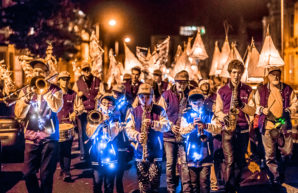Participatory Arts in Peril
Posted by Sandra Wood on 03 July 2020
Participatory Arts in Peril
Over the last few days the news from the arts world has become increasingly desperate. The economic damage and loss of income due to the COVID crisis is hitting hard. Many theatres are now warning of significant redundancies, including venues like Manchester’s iconic Royal Exchange. Nuffield Southampton Theatres will close permanently. Social media has been full of calls to support live music venues and festivals. The #LetTheMusicPlay campaign is highlighting that 50% of the live music industry workforce is facing unemployment.
The focus of this grim news has been theatre and live music because of the starkness of the situation. James Dacre at the Royal and Derngate Theatres wrote that 90% of their income is earned through ticket sales and bar revenue. This is simply money that has vanished overnight, and that will not return any time soon if social distancing continues.
The possibility that a venue like the Royal Albert Hall may close is of course headline grabbing. But equally, the world of participatory and community arts where More Music operates is just as much under existential threat. Music education, reaching out to young people in challenging circumstances, community choirs, creative arts for health and wellbeing, all of these need dedicated professionals to deliver and resources to make happen. This is now all under threat. Community arts organisations have been incredibly resourceful in how we support our activity financially. We have developed workshop income, schools’ contributions, been flexible with ‘pay what you can’ arrangements for sessions, sought new kinds of partnerships.
But for More Music, our most rose-tinted -glasses optimistic forecast is that we will lose £60,000 of this type of income this year. For every day without clarity on how the arts come out of lockdown, and without emergency support that recognises the severity of the crisis, the losses pile up. This is the case for all organisations doing creative work in communities. It is simply not sustainable. Particularly when years of austerity and local funding cuts have already taken their toll.
We mourn the damage to our best known arts institutions. But thousands more tiny tragedies are about to unfold in grassroots organisations. This is work that takes years to establish well, and is hard to replace. We know we work with young carers, older people at risk of isolation, people with mental health challenges, food bank users, refugees and asylum seekers. The value of this work is not “just” entertainment, all too often we are stepping in to the breach of a society that has been shattered and splintered.
Fundamentally, companies like More Music which are less dependent purely on box office have a decent chance of getting through a long COVID crisis. But what is needed is positive action –
- There has to be co-ordinated and clear advice with an explicit time schedule for earliest possible changes. And guidance need to be detailed, timely, and not trailed in Daily Telegraph.
- There needs to be a support package that explicitly recognises the specific needs of the community and participatory arts sector, focusing on supporting access, talent retention and practical funding for COVID mitigation appropriate to the settings we work in.
- An equity based approach to emergency funding recognising the historical imbalances there have been in support particularly for towns, rural areas and working class districts.
- Finally, there needs to be real respect for the work of community and participatory arts. We need to be at the table at the heart of decision making.
The government has called for “shovel ready” projects. Well, the guitars are ready, the gamelans are ready, the iPad orchestras are ready, the YouTube home recorders are ready, the vocal chords of thousands upon thousands are ready. Don’t silence them through inaction now.
